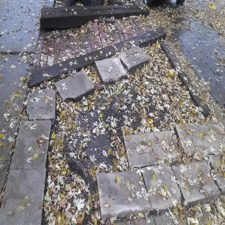Umbrella Music Festival 2013 Day 2

07 Nov 2013
Idyllic Sadism: Day Two of the Umbrella Music Festival
While Seval is made of free improvisors––Sofia Jernberg on voice, Emil Strandberg on trumpet, David Stackenäs on guitar, Fred Lonberg-Holm on cello, Patric Thorman on doublebass––and the songs are only loose forms, their music could easily be mistaken for mellow drumless pop. A typical moment of their concert featured melodic trumpet, minimally thumping bass, solemn cello, and quiet freakouts on guitar and voice. Then suddenly the rhythm dissolved. And just as suddenly at least one band member began repeating a new structured passage. Listening to their full sound is like remembering a dream: some distinct images are clear, but how you get from one to another is an obscure jumble, and what was going on in the corner? So many things are happening at once in this quintet that the wholeness of their beautiful exterior sound is, oddly, both complimented and aggravated by the individual elements of each musician’s contribution. Stackenäs played a series of plinking wind-chime harmonics that perfectly captured the strange resonance of Preston Bradley Hall, and then I noticed a catlike whining from Strandberg’s trumpet, and that all made sense with the perfume and homelessness I could smell in the section where I was sitting. Jernberg’s voice––so rich, so wide, so woodsy, so full of color, so polished it glows––is in some ways the center of the band, as vocalists, unlike any other musicians, have the strange tendency/obligation to look at the audience. But the lyrics––“you may think you’re immune to love” and “I know you’ll come back someday”––evoke emotions and places that the music wouldn’t naturally conjure, and the combination is pretty and surprising, a banal coffee cup with a gorgeous purple sapphire lodged on the handle. And a gilded window on the backside, so you can see your coffee sloshing more intimately, properly acknowledged. This is music to be fingernail-tickled to.
The second set quartet matching Austrian drummer Wolfgang Reisinger with locals Jason Roebke on doublebass, Paul Giallorenzo on piano/synthesizer and now-Baltimorean Jaimie Branch on trumpet covered a significantly diverse amount of improvisatory territory. I heard several festival stalwarts commenting afterwards to each other that it was “the best set of the fest.” I wouldn’t go that far, but I was surely impressed by the variety of exchanges between the musicians. Everyone started softly, but one look exchanged between Roebke and Reisinger led to a low, loud thwack and swift acceleration, Branch immediately responding with dizzy spirals. When she stepped off, Reisinger added small electronic snippets to his rhythmic sequence, sending Giallorenzo inside the piano, where he found impeccably timed bass-string plucks and thuds. When he went back to the piano, I noticed that he plays like he’s taking breaths, pausing at regular intervals and intaking the group sound, a choppy Tyner. When he switched to synthesizer later in the set, the piano keys became web-footed and web-fingered as he catapulted pulses back and forth with Reisinger. As the formerly mentioned stalwarts also noted, Branch was really on point this set, shivering out deep-fat-fryer oil spit and hiss, and even getting really mean and shocking with villainous blasts. All that spit and breath were like a sea mammal breaching the surface to exhale after a long swim and coming up all bright and slippery, her solo an extraordinary growl of mad cauldron spoils. Roebke ran a marmalade stand, making thump marmalade. Instead of grinding spices to just sprinkle a little into a dish, these four were using the whole seeds to season.
Swiss tenor sax and bass clarinetist Christophe Erb opened the third set with a lofted tenor loudly bellowing an Albert Ayler invocation. Jim Baker kicked out a wet, frothy synthesizer garble that was a bigger presence in the room than was actually audible, like inhuman hertz were involved. Drummer Frank Rosaly skittered and pounded in nimble ferocity. After the recognition of this one gallant boom of an introduction, I had a hard time finding my way into this trio’s set, the density so stuffed as to be impenetrable. I couldn’t tell if the mass of simultaneity was rich with communication that I couldn’t grasp, or if a kind of overinteraction was at play. When Erb moved to bass clarinet, he took a distinctly onanistic stance with the bell of the horn in the pocket of his upper thighs and slapped the keys accordingly; discomfit much? Cooking times vary according to amount of heat in use; when you don’t know the level of heat you don’t know if it’s raw or overcooked.
Locals Jason Adasiewicz on vibes, Joshua Abrams on doublebass/guimbri, and Avreeayl Ra on drums teamed up with two Frenchman, drummer Benjamin Sanz and trumpeter/flugelhornist Aymeric Avice for the final set. Adasiewicz’ vibes are like the first doorbell ring of a party you’re hosting, thrilled anticipation amok. When Abrams took his first solo it got the quintet synced up into some cool and subtle complementarity, and all of a sudden Abrams’ bass that was distant when they started was now crystalline, paradoxically more audible and centered when the whole group was playing than when by itself. During the inevitable drum duo, Adasiewicz played hard, non-resonant clatters, like struck corrugated tin on the vibes, adding just enough third-wheelishness to prevent percussive insularity. From that point on, the set went in and out of cohesion: just when I thought they all came together and Avice, with both a trumpet and a flugelhorn against his lips simultaneously, unleashed a perfect set of double brass blasts, the groove wilted away again. But that’s how life is: in step, and then not. Abrams’ guimbri playing reminded me of Cooper-Moore’s great investigations into the manifold soundworlds of wood. Avice played a flugelhorn solo that sounded like Freddie Hubbard slamming the door on himself. The quintet hit another stride in which all the instrumentalists were able to expect enough of a modicum of consistency from each other that they were each individually able to delve into more and more unique nooks: stretching out to get tighter. Unfortunately, this band could not figure out a way to end this set: time wore on and opportunities presented themselves–– Adasiewicz made valiant attempts to signal crescendo and kaput; Abrams patiently listened during a Ra solo on a fat, wooden recorder-ish thing that could have beautifully framed the proceedings––but they just couldn’t end it altogether as a band. Eventually, the lights had to be turned on; the building was closing, forcing a more abrupt denouement than was natural. As Stalmokas mentioned to me later, “Hey, it’s improvised, you can’t control it.”
– Andrew Choate
loudly bellowing a Swiss Alpine horn via Coltrane invocation.
